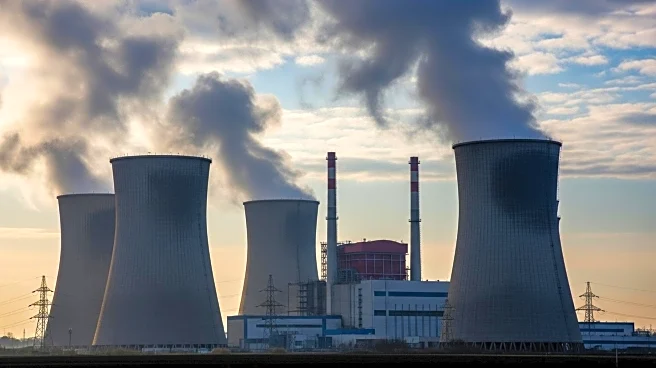What's Happening?
Russia has disconnected the Zaporizhzhia Nuclear Power Plant from Ukraine's power grid, aiming to integrate it into the Russian network. Ukrainian Foreign Minister Andrii Sybiha announced this unprecedented move, marking the first such attempt in nuclear energy history. The plant has been in blackout mode for nearly three weeks, relying on backup diesel generators for critical safety systems. Sybiha accused Russia's Rosatom of violating nuclear safety protocols and attempting to deceive the International Atomic Energy Agency (IAEA). The IAEA confirmed shelling near the site, with Russia blaming Ukrainian forces, which Ukraine called a provocation. The plant, Europe's largest, has been under Russian occupation since March 2022, and its reactors have been shut down since the invasion began.
Why It's Important?
The disconnection of the Zaporizhzhia Nuclear Power Plant from Ukraine's grid poses significant risks to nuclear safety in Europe. The plant's reliance on backup generators increases the potential for a nuclear incident, which could have catastrophic consequences. The move also highlights the geopolitical tensions between Russia and Ukraine, with Russia's actions seen as a power grab. The situation raises concerns about the safety of nuclear facilities in conflict zones and the potential for international diplomatic fallout. The involvement of Rosatom and the accusations of safety protocol violations could impact global nuclear energy policies and international relations.
What's Next?
The ongoing situation at the Zaporizhzhia Nuclear Power Plant may lead to increased international scrutiny and diplomatic pressure on Russia. The IAEA and other international bodies may seek to intervene to ensure the safety of the plant and prevent a nuclear incident. Ukraine may continue to push for international support to regain control of the plant and secure its energy infrastructure. The geopolitical tensions could escalate, affecting regional stability and international relations. The situation may also influence global nuclear energy policies, with increased focus on the security of nuclear facilities in conflict zones.
Beyond the Headlines
The disconnection of the Zaporizhzhia Nuclear Power Plant from Ukraine's grid raises ethical and legal questions about the use of nuclear facilities as tools of geopolitical power. The situation highlights the vulnerability of critical infrastructure in conflict zones and the potential for human rights abuses, as reported by the Kyiv-based human rights group Truth Hounds. The forced cooperation of Ukrainian nuclear specialists with Rosatom poses risks to their safety and the integrity of nuclear operations. The incident may lead to long-term shifts in international nuclear energy policies and increased efforts to protect nuclear facilities from geopolitical conflicts.










